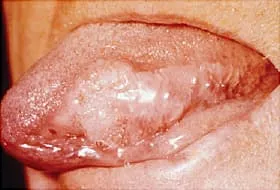What Is Tongue Cancer?
This is one of the several kinds of oral (mouth) cancers. Like other cancers, it happens when cells divide out of control and form a growth or tumor.
There are two types. One is called oral tongue cancer because it affects the part you can stick out. The other happens at the base of your tongue, where it connects to your throat. This type, called oropharyngeal cancer, is often diagnosed after it has spread to the lymph nodes in your neck.
Tongue cancer is less common than many other types. Most people who get it are older adults. It's rare in children.
Tongue Cancer Symptoms

You may also have:
- Pain in or near your tongue
- Changes in your voice, like sounding hoarse
- Trouble swallowing or chewing or with moving your jaw or tongue
- Numbness of the tongue or mouth
- Jaw swelling
- Constant sore throat
- A feeling like something is caught in your throat
- Swollen lymph nodes in your neck
- Coughing up blood
- Weight loss
- Ear pain
- Bleeding in your mouth
- A lump in the back of your mouth, throat, or neck
If you have a sore on your tongue or in your mouth that doesn't get better in a couple of weeks, see your doctor.
If the problem is at the base of your tongue, you may not notice any symptoms. Your dentist may find signs of tongue cancer during a checkup, or your doctor might notice something during a regular exam.
Causes of Tongue Cancer
The human papillomavirus (HPV) can cause cancers on the base of the tongue. HPV also can infect your genital area and cause cervical cancer, penile cancer, and anal cancer. HPV infection is the most common sexually transmitted infection. There are many types of HPV. The ones that raise your odds of getting cancer are called high-risk HPVs.
Other things that may raise your chances of getting tongue cancer include:
- Tobacco use
- Alcohol use
- Jagged teeth
- Not taking care of your teeth and gums
- Chewing betel, common in South and Southeast Asia
- A personal history of certain cancers
- A poor diet
Your genes also may play a role in whether you're likely to get tongue cancer.
Tongue cancer is more common in men and people assigned male at birth than in women and people assigned female at birth. You're also more likely to get the illness if you're 45 or older and have a weakened immune system.
Diagnosis of Tongue Cancer
Your doctor will examine your mouth and ask questions about your symptoms. Then, they may suggest testing to diagnose tongue cancer, including:
Imaging tests. These tests, such as X-rays, CT, MRI, and PET scans, capture detailed pictures of your mouth, including where the cancer is located and its size. You could also need a barium swallow, a type of X-ray where you drink a liquid called barium. It makes the signs of cancer more visible on X-rays.
Biopsy. Your doctor may also take a sample of tissue from your mouth to test (a biopsy). They could use different techniques to get the sample, including:
- Brush biopsy. In this method, doctors use a stiff brush to gather cells from your tongue, moving the brush in a circular motion.
- Incisional biopsy. This is where a doctor makes a small elliptical-shaped cut on your tongue to remove tissue samples.
Endoscopy. During this test, your doctor will insert a thin tube fitted with a light and camera into your nose and down your throat, where they'll look for signs of cancer. An endoscopy can also show if cancer has spread to other areas of your throat.
Tongue cancer staging
Diagnosis also helps your doctor figure out the stage of your tongue cancer, meaning how large the tumor is and whether it has spread. Understanding your cancer stage also offers details about:
- How serious your cancer is
- Your survival chances
- Which treatment will work best for you
- Clinical trials
Doctors use different staging systems, but TNM is the one they use the most for cancer reporting. In this system:
- "T" describes the size and scope of the main tumor called the primary tumor
- "N" describes how many of your lymph nodes have cancer
- "M" describes whether your cancer has spread to other parts of your body (metastasized)
The TNM system also uses a series of numbers after each letter to provide even more information about the cancer, like the size of the main tumor.
Treatment of Tongue Cancer
Your treatment will depend on where your tumor is and how big it is.
- Surgery. During this operation, called a glossectomy, a surgeon takes out all or a portion of your tongue, depending on how large the cancer is. They'll also remove some healthy cells surrounding your tongue. If it looks like the cancer has spread to your lymph nodes, the surgeon could take out some of this tissue (called a neck dissection). After surgery, you may need physical therapy and rehab for speaking and swallowing problems.
- Reconstructive surgery. Doctors use this type of surgery to restore parts of your face or mouth that need to be removed during a cancer operation. They'll take healthy bone or tissue from other parts of your body and use it to replace parts of the tongue, lip, face, and other areas.
- Radiation therapy. This treatment directs strong energy beams from X-rays, protons, or other means at specific places on your body to kill cancer cells.
- Chemotherapy. With this treatment, you'll take medicine before or after cancer surgery to control cancer cell growth or kill lingering cells.
- Targeted therapy. Targeted therapy kills cancer cells by attacking specific chemicals within them. Doctors may use it to treat tongue cancer that has returned or spread beyond the tumor.
- Immunotherapy. If you have advanced tongue cancer and other treatments aren't working, your doctor could suggest immunotherapy. It works by helping your immune system to locate and kill cancer cells.
You may also want to consider a clinical trial for tongue cancer, where you'll have the chance to try a new treatment. Talk to your health care team if you're interested in joining a clinical trial.
After any treatment, you'll need regular checkups to make sure the cancer hasn't come back.
Is cancer of the tongue curable?
The earlier a doctor diagnoses your tongue cancer, the more likely you are to have a successful treatment. The 5-year relative survival rate for tongue cancer is 69.7%. This number represents how many people with tongue cancer are alive at the end of 5 years.
Complications of Tongue Cancer Treatment
Treatment of tongue cancer can cause other health problems. Here's a look at some of them:
Surgery complications
- Bleeding
- Infection
- An abnormal passageway that forms between your mouth and the skin on your face
- Speech problems
- Trouble swallowing
- Pain when swallowing
Radiation complications
- Inflammation of the mucous membranes that line your mouth and gastrointestinal tract
- Skin damage
- Bacterial skin infection (cellulitis)
- Changes in your sense of taste
- Dry mouth
- Fibrosis
- Nerve damage to your mouth
- Bone death in your lower jaw
- Underactive thyroid (hypothyroidism)
Chemo complications
- Infection
- Inflamed mucous membranes in your mouth
- Issues with your salivary glands
- Changes in your sense of taste
- Pain
- Fluid loss (dehydration)
- Malnutrition
Tongue Cancer Prevention
We know that many cases of base-of-the-tongue cancer are caused by HPV. Some things that may make you less likely to get this type of cancer are:
- Get vaccinated for HPV, depending on your age. Speak to your doctor about your options.
- If you are sexually active, use latex condoms every time you have sex.
- Don't use tobacco in any form.
- Don't chew betel.
- Avoid heavy or frequent alcohol use.
- Take good care of your teeth and gums.
Takeaways
Facing a serious illness like tongue cancer can be worrying, but there are ways to cope. Ask your doctor questions about your cancer and treatment options and look for reliable sources of information. Stay connected with friends and family, involve them in your life, and accept their offers of help. Finally, find someone to talk to, like a counselor or support group, who can provide valuable support during this challenging time.

